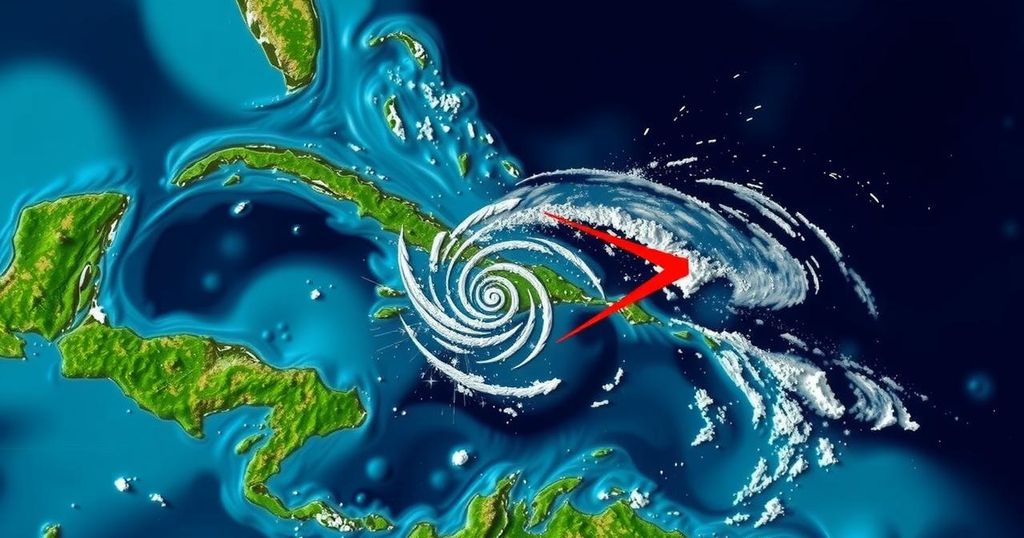Tropical Storm Oscar Moves Toward the Bahamas After Impacting Cuba

Tropical Storm Oscar is heading towards the Bahamas after making landfall in Cuba as a hurricane, resulting in at least six fatalities and heavy rainfall. The storm, which is now categorized as a minimal tropical storm, is expected to deliver significant rain to the Bahamas, with warnings in effect. It has been noted for being the smallest hurricane on record. Concurrently, NOAA predicts an above-average hurricane season amid severe weather patterns.
Tropical Storm Oscar is progressing towards the Bahamas following its impact on Cuba as a Category 1 hurricane. The storm has sadly resulted in at least six fatalities while delivering severe rainfall to the region, which is concurrently experiencing a significant power crisis. As of Tuesday morning, Oscar was situated approximately 45 miles south-southeast of Long Island, Bahamas, with sustained winds recorded at 40 miles per hour and moving in a north-northeast direction at 12 miles per hour, as reported by the National Hurricane Center in Miami. Currently considered barely a tropical storm, Oscar is anticipated to produce rainfall amounts of up to 5 inches across southeastern Bahamas, and up to 8 inches in isolated areas. A tropical storm warning has been declared for the central and southeastern Bahamas. The storm has made history as the smallest hurricane ever recorded, characterized by a wind field of merely 6 miles across. Its unprecedented landfall in Grand Inagua Island on Saturday, followed by a second landfall in eastern Cuba, caught meteorologists off guard. Michael Lowry, a hurricane specialist, noted, “It’s not often we see a colossal failure in hurricane forecasting,” remarking on the inability of models to predict Oscar’s strengthening into a hurricane. As Oscar brought over 15 inches of rain to parts of eastern Cuba, concerns over flooding and potential landslides have arisen, particularly in Guantánamo where the six casualties occurred. Cuba is presently grappling with recovery efforts from a massive blackout, which has incited public protests. Oscar is cataloged as the 15th named storm and the 10th hurricane of the active Atlantic hurricane season, which runs from June 1 to November 30. The National Oceanic and Atmospheric Administration has projected an above-average hurricane season this year, attributing it to extraordinarily warm ocean temperatures, forecasting 17 to 25 named storms and four to seven major hurricanes of Category 3 or higher. Concurrently, Tropical Storm Kristy is developing in the Pacific Ocean, positioned 375 miles west-southwest of Acapulco, Mexico, with expectations to strengthen into a hurricane tonight.
The Atlantic hurricane season spans from June 1 to November 30 annually, during which the National Oceanic and Atmospheric Administration (NOAA) forecasts storm activity. The presence of warm ocean temperatures has a direct correlation with hurricane formation, resulting in increased predictions for named storms and hurricanes in comparison to average years. Tropical Storm Oscar emerged as a significant weather event, impacting Cuba prior to moving towards the Bahamas. Its unexpected intensity and the concurrent crises faced by Cuba underscore the challenges faced in storm forecasting and emergency management.
In summary, Tropical Storm Oscar has transitioned towards the Bahamas after causing devastation in Cuba, characterized by significant rainfall and loss of life. The unexpected strengthening of Oscar into a hurricane highlights discrepancies in predictive modeling. As Oscar poses further threats to the Bahamas, the surrounding regions must brace for additional rainfall and possible flooding. This incident serves to remind us of the unpredictability of tropical storms and the need for continual advancements in forecasting practices.
Original Source: apnews.com








